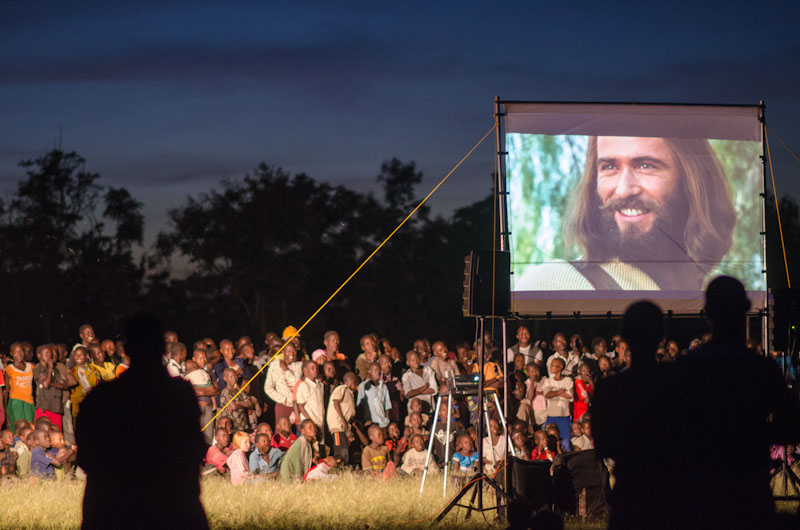Jesus Film Project has just reached a remarkable milestone: the JESUS film, already the most translated film in history, is now available in its 2,200th language, Bouna, spoken by the Kulango people in Côte d’Ivoire.
This new translation is more than a world record - it’s the fulfilment of a 25-year-old prayer by Josh and Holly Newell, who once stood on a West African hillside praying the gospel would one day reach those remote villages. Today, Josh leads Jesus Film Project, and that prayer has become a reality, as the JESUS film is reaching countless more communities.
The Bouna version was created in real, and lasting partnership with local believers, linguists, and community leaders, many of whom heard Jesus’ words in their heart language for the first time.
We know that this is a story well worth sharing, as it inspires everyday believers that together, we are truly reaching the 'ends of the earth' in new and innovative ways.
First released in U.S. theaters in 1979, the JESUS film has since been shown in nearly every country around the globe, introducing over 11 billion people to the story of Jesus Christ in their heart language.
Recognized by Guinness World Records for surpassing 817 translations, the film, now over 45 years old, continues to break records. While the first 1,000 translations took 32 years, the most recent 1,200 were completed in just over a decade.
Thanks to advances in recording technology and digital tools, the team has made unprecedented progress in its mission to reach every language on earth.
This technological leap enabled the translation and recording of the Bouna version, a language spoken in a part of West Africa that is particularly unreached with the gospel.
This translation milestone is especially meaningful to Josh Newell, executive director of Jesus Film Project, and his wife, Holly. Nearly 25 years ago, during a trip to neighboring Burkina Faso, a local Bible translator took them to a remote hillside and asked them to pray that one day the gospel would reach the villages beyond the border, home to the Kulango people. “Look at the land beyond,” the translator had said. “I cannot go there or learn their language. Will you pray with me that one day God will reach those villages?”

That prayer has become a reality. With the new Bouna translation, church leaders and local believers now have a powerful tool to share the message of Jesus with more than 300,000 Kulango people living in one of the most remote areas of West Africa.
The journey to bring the JESUS film to the Kulango people of Bouna was marked by a long road that started with Josh and Holly’s prayer. However, from the beginning, this translation was not about doing something for the local people, but rather about collaborating with them in the work. Often, local Christians even took the lead in the project. Indigenous speakers were involved at every stage, from script development to voice recording and review. Workshops brought together trained linguists and passionate local leaders, sometimes working on the script line by line to ensure the meaning of the story and the Scriptures remained intact. In fact, the Bouna translators requested more intensive linguistic review than most, often involving three expert listeners in the room, instead of the usual one or two, to ensure linguistic accuracy.
Each line had to carry the full weight of Scripture, while making sense to everyday speakers. Dialogue directors and translators worked side-by-side, asking difficult questions about nuance, idiom and meaning. The goal wasn’t just accuracy in translation, but true, lasting ownership in the project. Nearly 30 local voice actors participated in the recording, many of them moved to laughter or tears as they heard the story of Jesus in their own language for the very first time. One government official, unable to read the script due to low literacy, insisted on participating orally.
“It means so much to me that you are doing this for my people,” he said. “No one has ever done something like this before.” Another government official had long dreamed of bringing a film to his people in their heart language, and volunteered to help oversee the Kulango Bouna translation. “When you’re speaking in a trade language, you’re reaching the mind,” he said. “But when I hear the message in my own language, it reaches my heart.” As with every JESUS film translation, the culmination of this labour of love was a community celebration with a premiere of the film in the new language before the translation was released to the JESUS Film app. Villages from across the region were invited, offering the opportunity for local people to hear the gospel for the first time, and eventually, for the planting of churches in the area.
Only a small percentage of the Kulango, Bouna-speaking population currently identifies as Christian, most adhering to local religions. This means that the impact of the JESUS film is all the more profound in sharing the gospel with everyone, everywhere. By God’s grace, the JESUS film offers an accessible way for people to hear and respond to the words of Jesus, most for the very first time.
You can watch JESUS in the Bouna language here, or on the JESUS Film app. To follow the ongoing work of Jesus Film Project, subscribe to JFP News, a bi-weekly newsletter featuring inspiring stories and updates on the latest tools, translations and outreach efforts.
